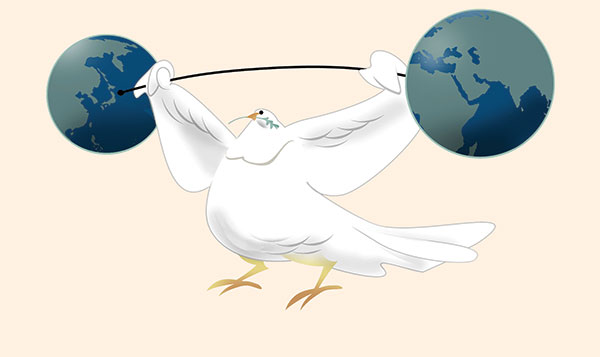Peace in our time


Roula Khalaf, Editor of the FT, selects her favourite stories in this weekly newsletter.
When war broke out in August 1914, crowds in Trafalgar Square cheered. In Germany, even the liberal novelist Thomas Mann exulted, “War! We felt a cleansing, a liberation.” The “world of peace” had bored him.
His words show how far we have come since. Most recent commentaries about 1914 emphasise current risks of war. Yet today’s overriding reality is peace – more widespread internationally and domestically than probably ever before. Armed conflict and violent crime are declining, as the Harvard psychologist Steven Pinker describes in his seminal The Better Angels of Our Nature. What if trends are towards even more peace?
The notion that we live in peaceful times is counter-intuitive. Years after the attacks of 9/11, a woman from ostensibly calm Jupiter, Florida, asked me, “Don’t you think this is the most dangerous time in history? My friends and I call each other, we hardly dare leave the house. We just pray our children are safe.” The mind springs easily to today’s actual conflicts, because TV news is about bad things: terrorists, drones, Syria, incipient civil wars in South Sudan and the Central African Republic, murders everywhere.
Yet these are exceptions. The estimated 73,455 Syrians killed in 2013 represent more than half the world’s deaths in armed conflict last year. Pinker says that annual deaths in battle dropped by over 90 per cent from the late 1940s through the early 2000s.
Just since the 1990s, various trends have been pushing us further towards peace. On average, humans have been getting more educated, rich and internationally connected, and more likely to live in democracies. These factors would tend to reduce violence. Indeed, by some definitions, there have been no interstate wars since 2008. Meanwhile, homicides have dropped across the western world, with US murder rates down to 1960s levels.
Twenty years ago, great military powers had recent memories of “happy” wars: swift victories over bad guys, as in the Falklands and the first Iraq war. Since then all their war memories have been bad, which encourages peace.
So does TV. Certain news channels are quite as idiotic as the Anchorman movies suggest, yet they are brilliant peacekeeping devices. The Ukrainian famine, the Bengal famine of 1943, the Holocaust and China’s “Great Leap Forward” occurred off camera but today if any soldier fires a shot almost anywhere, CNN is on to it. Then politicians rush to intervene. They’d have stopped the first world war fast if soldiers had live-tweeted the carnage.
Smartphones have extended the media’s reach. A decade ago, there might have been two television cameras in South Sudan. Now almost everything gets filmed.
Tolerance for violence is at a low. The cheering crowds of 1914 would have thought us soft and flabby. But whereas they didn’t know about machine guns, we’ve seen atom bombs. Even Robert Gates, the long-time US defence secretary, sounds almost like an anti-war hippie in his new memoir Duty. “Even thinking about the troops,” he writes, “I would lose my composure with increasing frequency. I realised I was beginning to regard protecting them – avoiding their sacrifice – as my highest priority . . .this loss of objectivity meant it was time to leave.”
Interstate wars could return. China and Japan are now squabbling over some rocks in the East China Sea. However, Rana Mitter, professor of Chinese history at Oxford university, says: “I don’t think there’s a prospect of war.” No constituency in China is advocating military adventures abroad, he explains. Anyway, if Chinese soldiers died, the Chinese public “could turn against the party”.
What about an accidental slide into war? Mitter retorts that after China extended its “air-defence zone” in November, the resulting tensions soon eased, “perhaps in part because Joe Biden turned up and told everyone to cool it”. Unlike in 1914, today’s international environment encourages peace. Looking at recent trends rather than 1914, expect the following:
• The American deal with Iran will stick, and Israelis and Palestinians will keep moving towards peace. The public in all these countries probably prefers peace, and if they chose war, foreign allies and media would punish them.
• Global defence spending will keep falling. In 2012 it dropped slightly for the first time since 1998, says the Stockholm International Peace Research Institute. The decline probably deepened in 2013.
• Armies will increasingly commit violence in secret, using drones or camera-free interrogation chambers. No US government will again allow a televised war like Vietnam.
• Tough guys will lose elections. Historically, Republicans in the US campaigned on promises to be tough on crime and tough in war. They will miss crime and war.
• International trade will keep growing. Last month the World Trade Organisation agreed its first ever deal on global trade.
• Politicians will continue to lose status, as they no longer pursue national glory but quibble over pocketbook issues they can’t even control. Napoleon is a grander figure than François Hollande, even though it’s better to live in a country ruled by Hollande.
Still, I’m not one of those pundits who can tell the future, so perhaps all this will change.
simon.kuper@ft.com; Twitter @KuperSimon
Comments